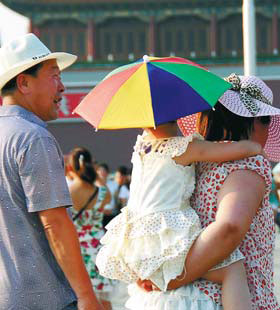So hot it can kill you
Updated: 2012-07-25 08:07
By Liu Zhihua (China Daily)
|
|||||||||||
|
Tourists wear hats to protect themselves against the scorching sun in Beijing. Wen Bao / Asia News Photo |
Get out of the heat. Keep cool and stay alive. When the temperatures soar, the body can overheat to such an extent that it can no longer regulate its own temperature through perspiration and the evaporation of sweat, which lowers body temperatures.
That is when the body can suffer from heatstroke, which may lead to organ failure and death.
In the summer of 2010, Beijing-based consultant Qin Le was on a business trip to Fuzhou, Fujian province, when he suffered from a puzzling disease.
He was staying about 10 minutes from the office, so he chose to walk back for a break at noon, and then walk back to work - without any protection from the sweltering heat. Soon after, he suddenly suffered from a fever, profuse perspiration, dizziness and breathing difficulties. He dismissed the symptoms as that of a cold and self-medicated without seeing a doctor.
A week later, the symptoms got worse, and he also started having diarrhea.
When he went to a hospital, he was diagnosed with heat exhaustion, a heat-related illness that was precursor to heatstroke.
"Heatstroke is a medical emergency, and can be fatal if not treated promptly," says Gu Chengdong, vice-director with the Emergency Department of China-Japan Friendship Hospital in Beijing.
When the outdoor temperature is high, or when a person engages in strenuous physical activity in an over-heated environment, the body is unable to balance heat gain and heat loss through the normal course of evaporation of perspiration.
The internal temperature rises, causing symptoms, such as heat syncope (fainting), heat tetany (hyperventilation, breathing difficulties) and heat exhaustion (muscle weariness, nausea) and eventually, heatstroke.
Heatstroke usually happens when the body temperature reaches 40 C, and at that stage, cells are damaged, the central nervous system is harmed, the metabolism disrupted. It may also result in fatal organ failure, Gu notes.
"Kids, the elderly, outdoor workers, new mothers, and people with chronic diseases are high risk groups for heatstroke," says Liao Shaofang, director with the Emergency Room of Tsinghua University No 1 Hospital in Beijing.
"The human body cannot lower its temperature efficiently in a hot and humid environment. Some people refuse to use the air-conditioner and electric fans for fear of catching cold, or to save money. And yet, they exert themselves in the heat. It's very unwise," Liao says.
Liao quotes the example of a 17-year-old girl he failed to save in 2009.
The girl was a restaurant worker, and her job was to make steamed buns. She fainted suddenly during work, and when she was sent to Liao, her body temperature had soared to 42 C.
Although the medical team used ice sheets and life-support measures, she passed away from kidney and heart failure.
"There is almost no chance of recovery when heatstroke is so severe that it causes multi-organ failure," Liao says.
In recent years, as the authorities realize the fatal threats of heatstroke to outdoors workers, preventive measures have been put in place and outdoor workers suffering heatstroke have become more rare.
It is now the ordinary people who must be educated about the dangers of heatstroke, says Gu, the emergency doctor with China-Japan Friendship Hospital.
Liao, the specialist, says the majority of heatstroke patients at Tsinghua University No 1 Hospital are the elderly with low immunity, especially those with chronic diseases, new mothers who are in confinement indoors according to Chinese custom, and children who are in poor physical shape.
Although the hazards vary, heatstroke is actually easy to prevent, doctors say.
As long as one avoids staying in a hot and humid environment for a prolonged period, keeps a light diet in summer, and drinks slightly salted water after profuse perspiration, it can be avoided, Gu says.
Keep cool in summer. It may save your life.
Contact the writer at liuzhihua@chinadaily.com.cn
(China Daily 07/25/2012 page19)
Today's Top News
Rescuers race against time for quake victims
Telecom workers restore links
Coal mine blast kills 18 in Jilin
Intl scholarship puts China on the map
More bird flu patients discharged
Gold loses sheen, but still a safe bet
US 'turns blind eye to human rights'
Telecom workers restore links
Hot Topics
Lunar probe , China growth forecasts, Emission rules get tougher, China seen through 'colored lens', International board,
Editor's Picks

|

|

|

|

|

|






